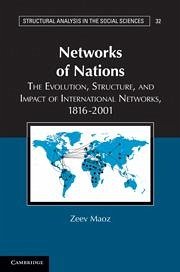Zeev Maoz
The Networks of Nations
Zeev Maoz
The Networks of Nations
- Gebundenes Buch
- Merkliste
- Auf die Merkliste
- Bewerten Bewerten
- Teilen
- Produkt teilen
- Produkterinnerung
- Produkterinnerung
Offers a novel perspective on the study of international relations as a system of interrelated networks that co-evolve and interact with one another.
Andere Kunden interessierten sich auch für
![New Threats and New Actors in International Security New Threats and New Actors in International Security]() New Threats and New Actors in International Security38,99 €
New Threats and New Actors in International Security38,99 €![International Relations Theory and International Law International Relations Theory and International Law]() Adriana SinclairInternational Relations Theory and International Law106,99 €
Adriana SinclairInternational Relations Theory and International Law106,99 €![Corporate Social Responsibility and the Shaping of Global Public Policy Corporate Social Responsibility and the Shaping of Global Public Policy]() M. HirschlandCorporate Social Responsibility and the Shaping of Global Public Policy52,99 €
M. HirschlandCorporate Social Responsibility and the Shaping of Global Public Policy52,99 €![The United Nations Under Kurt Waldheim, 1972-1981 The United Nations Under Kurt Waldheim, 1972-1981]() James Daniel RyanThe United Nations Under Kurt Waldheim, 1972-1981115,99 €
James Daniel RyanThe United Nations Under Kurt Waldheim, 1972-1981115,99 €![Transnational Activism and the Israeli-Palestinian Conflict Transnational Activism and the Israeli-Palestinian Conflict]() M. HallwardTransnational Activism and the Israeli-Palestinian Conflict102,99 €
M. HallwardTransnational Activism and the Israeli-Palestinian Conflict102,99 €![NGOs, IGOs, and the Network Mechanisms of Post-Conflict Global Governance in Microfinance NGOs, IGOs, and the Network Mechanisms of Post-Conflict Global Governance in Microfinance]() A. OhanyanNGOs, IGOs, and the Network Mechanisms of Post-Conflict Global Governance in Microfinance38,99 €
A. OhanyanNGOs, IGOs, and the Network Mechanisms of Post-Conflict Global Governance in Microfinance38,99 €![Ngos, Igos, and the Network Mechanisms of Post-Conflict Global Governance in Microfinance Ngos, Igos, and the Network Mechanisms of Post-Conflict Global Governance in Microfinance]() A. OhanyanNgos, Igos, and the Network Mechanisms of Post-Conflict Global Governance in Microfinance38,99 €
A. OhanyanNgos, Igos, and the Network Mechanisms of Post-Conflict Global Governance in Microfinance38,99 €-
-
-
Offers a novel perspective on the study of international relations as a system of interrelated networks that co-evolve and interact with one another.
Produktdetails
- Produktdetails
- Verlag: Cambridge University Press
- Seitenzahl: 448
- Erscheinungstermin: 6. Dezember 2010
- Englisch
- Abmessung: 231mm x 155mm x 30mm
- Gewicht: 703g
- ISBN-13: 9780521198448
- ISBN-10: 0521198445
- Artikelnr.: 31890668
- Herstellerkennzeichnung
- Libri GmbH
- Europaallee 1
- 36244 Bad Hersfeld
- gpsr@libri.de
- Verlag: Cambridge University Press
- Seitenzahl: 448
- Erscheinungstermin: 6. Dezember 2010
- Englisch
- Abmessung: 231mm x 155mm x 30mm
- Gewicht: 703g
- ISBN-13: 9780521198448
- ISBN-10: 0521198445
- Artikelnr.: 31890668
- Herstellerkennzeichnung
- Libri GmbH
- Europaallee 1
- 36244 Bad Hersfeld
- gpsr@libri.de
Zeev Maoz is professor of political science at the University of California, Davis and a distinguished Fellow at the International Center, Herzliya. He is the author and editor of twelve books and many scholarly articles. He is past president of the Peace Science Society (international), serves on the editorial board of several journals, and is the academic editor of the book series Innovations in the Study of World Politics.
Part I. What Are International Networks?: 1. Social networks analysis and
the study of world politics; 2. Fundamental issues in social networks
analysis - concepts, measures, methods; 3. The network structure of the
international system, 1816-2001; 4. Security egonets: strategic reference
groups and the microfoundations of national security policy; Part II. The
Formation of International Networks - Theory and Evidence: 5. Networked
international politics: a theory of network formation and evolution; 6.
Testing the theory of international network formation; 7. Nations in
networks: prestige, status-inconsistency, influence, and conflict; Part
III. The Implications of the Theory of International Network Formation: 8.
Democratic networks: resolving the democratic peace puzzle; 9.
Interdependence and international conflict: the consequences of strategic
and economic networks; 10. Evolution and change in the world system: a
structural analysis of dependence, growth, and conflict in a class society;
11. An international system of networks: interdependence, polarization,
balance, and international stability; 12. The network analysis of
international politics: insights and evidence.
the study of world politics; 2. Fundamental issues in social networks
analysis - concepts, measures, methods; 3. The network structure of the
international system, 1816-2001; 4. Security egonets: strategic reference
groups and the microfoundations of national security policy; Part II. The
Formation of International Networks - Theory and Evidence: 5. Networked
international politics: a theory of network formation and evolution; 6.
Testing the theory of international network formation; 7. Nations in
networks: prestige, status-inconsistency, influence, and conflict; Part
III. The Implications of the Theory of International Network Formation: 8.
Democratic networks: resolving the democratic peace puzzle; 9.
Interdependence and international conflict: the consequences of strategic
and economic networks; 10. Evolution and change in the world system: a
structural analysis of dependence, growth, and conflict in a class society;
11. An international system of networks: interdependence, polarization,
balance, and international stability; 12. The network analysis of
international politics: insights and evidence.
Part I. What Are International Networks?: 1. Social networks analysis and
the study of world politics; 2. Fundamental issues in social networks
analysis - concepts, measures, methods; 3. The network structure of the
international system, 1816-2001; 4. Security egonets: strategic reference
groups and the microfoundations of national security policy; Part II. The
Formation of International Networks - Theory and Evidence: 5. Networked
international politics: a theory of network formation and evolution; 6.
Testing the theory of international network formation; 7. Nations in
networks: prestige, status-inconsistency, influence, and conflict; Part
III. The Implications of the Theory of International Network Formation: 8.
Democratic networks: resolving the democratic peace puzzle; 9.
Interdependence and international conflict: the consequences of strategic
and economic networks; 10. Evolution and change in the world system: a
structural analysis of dependence, growth, and conflict in a class society;
11. An international system of networks: interdependence, polarization,
balance, and international stability; 12. The network analysis of
international politics: insights and evidence.
the study of world politics; 2. Fundamental issues in social networks
analysis - concepts, measures, methods; 3. The network structure of the
international system, 1816-2001; 4. Security egonets: strategic reference
groups and the microfoundations of national security policy; Part II. The
Formation of International Networks - Theory and Evidence: 5. Networked
international politics: a theory of network formation and evolution; 6.
Testing the theory of international network formation; 7. Nations in
networks: prestige, status-inconsistency, influence, and conflict; Part
III. The Implications of the Theory of International Network Formation: 8.
Democratic networks: resolving the democratic peace puzzle; 9.
Interdependence and international conflict: the consequences of strategic
and economic networks; 10. Evolution and change in the world system: a
structural analysis of dependence, growth, and conflict in a class society;
11. An international system of networks: interdependence, polarization,
balance, and international stability; 12. The network analysis of
international politics: insights and evidence.









